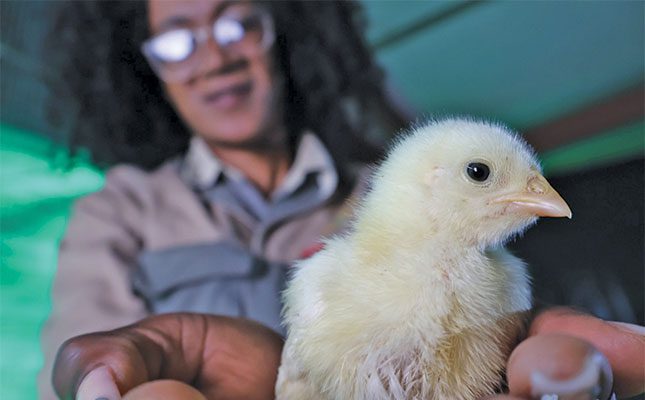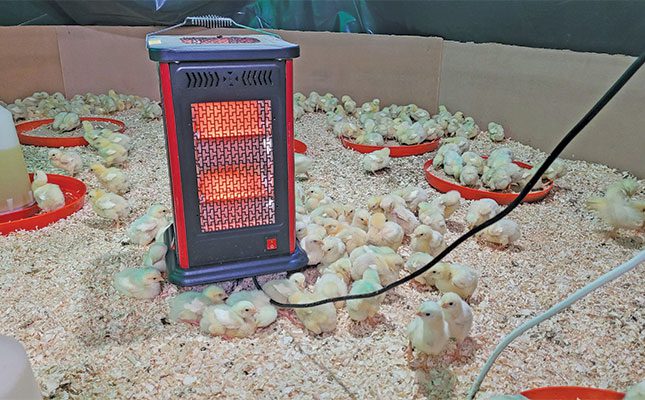
When opportunity comes knocking on Patricia Beleng’s door, she answers. In 2022, she was working as a security guard at Sasol in Sasolburg, Free State, when the company offered a farmer development programme for its staff.
“I didn’t know anything about farming at that stage, but I was looking for a challenge, something that would excite me,” says Beleng.
The course gave participants the option to choose between three commodities on which to focus: poultry, cattle, or vegetables. Since Beleng’s mother raised broilers in her backyard, she decided on poultry as she already had some familiarity with this industry.
After three months she was ready to take the leap into farming full-time, and resigned as a security guard. With little start-up capital, she converted her mother’s garage into a chicken coop, expanding the windows and fitting them with mesh wire and tarpaulin to keep the cold out. She stocked the coop with chickens, turning over 100 chickens every six weeks.
Market demand for Beleng’s broilers was consistent, even exceeding production. But a lack of financing meant that expansion was difficult. Recognising the importance of maintaining her market, she bought broilers from other farmers to resell to her market.
During this time she came across a farm in Deneysville that had the infrastructure she needed to expand production, although it was mostly dilapidated. The farm has nine chicken houses, each with a capacity for 3 000 chickens. There is also a hatchery and abattoir.
Beleng recognised its potential and approached the owners to convince them to lease her the farm.
“It was not easy – there were a lot of other farmers who were vying for the same property. I had to draw up a business plan and show the owners that I had the skills and drive to turn the farm into a productive unit.”
Beleng succeeded in this first step, securing the lease of the farm in 2024, but it only solved part of her problem. Stocking the chicken coops was an expense that was out of her reach.
The right partnerships
Beleng’s entry into farming has been a complete submersion, taking up all her time and focus. As such, her social media pages are dominated by farming content.
“I use social media, including WhatsApp groups, to find markets, inputs and research. I’m always on the lookout for any upskilling programmes I can attend.”
Last year, she came across an advertisement on Facebook calling for entries into the Standard Bank Kopano Business Development Programme. This programme supports entrepreneurs by providing them with the skills, mentorship, and financing to grow their businesses.
Beleng was accepted into the programme, and was not only able to gain vital skills that would help her manage and grow her business, but the financing she needed to buy additional chickens and move onto the rented farm.
Through the financing she could increase her flock from 100 to 300 chickens every cycle, and moved them onto the farm in December last year. By implementing the business skills she learnt, she has been able to increase the flock over the last six months, producing 600 broilers every cycle.
“The Kopano programme helped me to scale up, because I learnt how to optimally run the business so that my profit margins are bigger. I can now use this extra money to keep expanding.”
One of the most important lessons Beleng learnt from the programme was proper record-keeping.
“Keeping track of all the expenses, income and production outcomes helps me to see where I need to improve. By having these records, I can better plan financially for each cycle, ensuring I have everything I need to see me through the cycle and thereby optimise production.”
Beleng says one of the mistakes she made when she first started farming was not buying all the inputs needed for each cycle at the start.
“Chickens need good-quality feed if they are to reach their full weight at the right time and remain healthy. But quality feed is expensive, and there is always the temptation to skimp on this. I’ve learnt to buy everything I need for a batch of chickens when I buy the chicks. This includes all the feed, wood shavings and medicine. Then I know I have what I need to get them through the cycle.
“Otherwise, one ends up in week four or five, when there is no cash flow, without the income to buy the rest of the feed. You end up selling the chickens early, and underweight, and you don’t get much for them. Or you’d give them cheaper feed and end up producing hard body chickens, which the market doesn’t really want. Having the cash to make such a big investment at the start of the cycle is not easy, so you need to ensure your financial planning has been done properly.”
Having proper records in place has also meant that Beleng is able to apply for further funding.
“There is a lot of help available for new farmers, but you need to be able to show that you can make a success of farming.
“You need financial and production records so the funders can see that you are able to run a business. With this paper trail in place, it has been easier to get accepted into other business training programmes, and get funding.”
Keeping mortality rates low
Raising broilers to the six-week mark when they are sold is a process that requires a keen eye. The fragile day-old chicks must be kept in optimal conditions to keep mortality rates low. Beleng notes that the climate is the biggest challenge in raising the chicks.
“The chicks should be kept at a constant 27°C during the first two or three weeks and around 23°C thereafter. In winter, they need heating because they won’t survive the cold, and this requires electricity, which pushes up the costs. In summer, the tarpaulin on the sides is lifted so that there is a breeze and the chickens can be kept cool.”
She adds that the flock must be constantly monitored since their behaviour is indicative of their health.
“The chicks will huddle together if they are getting cold, whereas if they are stretched out, panting and lethargic, they are likely feeling too hot. Attention must also be paid to their excrement – if it’s white, foamy, or too runny, there is a problem. The excrement must be firm, green and brown. You also need to listen to the flock, because chickens will cough if they have flu, and older chickens’ breathing becomes laboured if they are sick.”

Constant monitoring is challenging for Beleng since she does not live on the farm, and is frequently attending training courses. This means she needs to rely on staff, who must be properly trained.
“Everything does not always run according to plan when I am not here and it is very stressful. I don’t have my own transport, so getting to and from the farm is costly and difficult. I am however in the process of fixing the house on the farm and will soon be able to move in so that I can be closer to the chickens.”
Beleng receives a batch of day-old chicks every two weeks in order to maintain consistent supply to the market. From day one to day five the chicks receive a ‘stress pack’ – vitamins mixed into their drinking water – to boost their immunity since they are fragile when this young. Between five days and three weeks old, the chicks receive normal drinking water.
They are then again given vitamin water to boost their immune systems just before they are vaccinated against Gumboro and Newcastle disease. Beleng is meticulous about biosecurity on the farm, implementing foot baths at the entrances to the chicken coops and sanitising the houses before each new batch of chicks arrives. The coops must also be adequately heated in the winter before the new chicks are placed.
“I don’t compromise on biosecurity. The chicks must be isolated, and I am careful about who I let into the houses. If just one chick gets sick, it can quickly infect the whole flock and within a few days you can lose your whole batch.”
Marketing was a key skill that Beleng picked up in the Kopano programme.
“I learnt the importance of identifying and understanding my target market to ensure I produce a product they want. Marketing is a vital pillar of the business plan and shapes the way my business is run.”
Beleng supplies her chickens to various markets, including two shisanyamas and four resellers. The chickens are slaughtered manually using a killing cone. They are then put through a plucker to remove the feathers. Gizzards are removed since they are sold separately, and the chickens are then packaged and frozen.
The shisanyamas take chickens as young as four weeks old, when they weigh around 1,2kg each. This means Beleng does not need to feed these chickens the costlier finisher feed, which saves her money. The reseller market comes with challenges. Beleng does not have a supply undertaking in place with the resellers, and their orders fluctuate based on what they are able to sell.
“I’m never quite sure how many of my broilers they will take,” she says.
Beleng aims to sell all of her mature broilers within two weeks of the end of the six-week growing cycle. Keeping them any longer means she can’t take in a new batch of chickens. Broilers that are not sold are therefore taken to a local auction that is held every Saturday.
“It’s good to have a backup market like this in place, although it does add to my costs since I need to hire transport to take the chickens to the auction venue.”
Ambitious plans for the future
Beleng’s farm has much potential for expansion and she fully intends on making the most of it. Her goal is to have all the infrastructure operational within the next three years, converting half of the nine chicken coops in layer houses, with the rest being used for broiler production.
Her plan also includes producing her own chicks in the hatchery, and mechanising the slaughtering process by making use of the abattoir infrastructure. Her plans are ambitious, but with much passion and drive she is moving closer to her dream.
“Yes, there are skills you need to be a farmer, but most of all you must have passion, and the right mindset. There are a lot of development programmes available for young farmers, and while it’s a start-up culture, with a low barrier for entry, you need to demonstrate that you have what it takes to succeed.
“Do your research, understand what it takes to succeed, and get your record-keeping in place so that you can prove what you are worth. Focus on growing your network, because there are opportunities around every corner.”
Beleng’s journey proves that with the right partnerships and persistence, growth is not only possible, but inevitable. Her farming business employs 17 people, making it a meaningful endeavour for her and the greater community, and shows what is possible when passion meets opportunity.
For more information email Patricia Beleng at [email protected].
Get trusted farming news from Farmers Weekly in Google Top Stories.
➕ Add Farmers Weekly to Google ✔ Takes 10 seconds · ✔ Remove anytime






